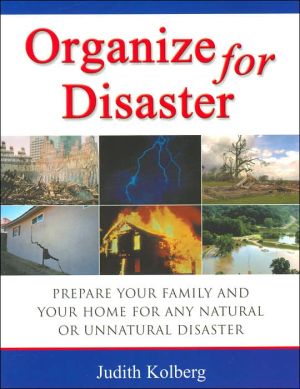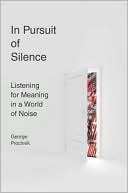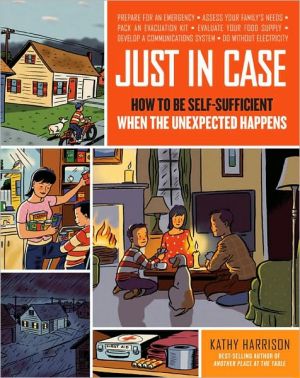Organize for Disaster: Prepare Your Family and Your Home for Any Natural or Unnatural Disaster
The world is a more dangerous place than it used to be. Organize for Disaster: Prepare Your Family and Home for Any Natural or Unnatural Disaster advises readers to prepare for disasters as part of everyday life instead of as an urgent event in the heat of the moment. Organize For Disaster closes the gap between awareness of the need to prepare and actual implementation by providing organizing tools for disaster preparedness such as shopping lists for purchasing disaster provisions; storage...
Search in google:
The world is a more dangerous place than it used to be. Organize for Disaster: Prepare Your Family and Home for Any Natural or Unnatural Disaster advises readers to prepare for disasters as part of everyday life instead of as an urgent event in the heat of the moment. Organize For Disaster closes the gap between awareness of the need to prepare and actual implementation by providing organizing tools for disaster preparedness such as shopping lists for purchasing disaster provisions; storage ideas; sample plans for communicating, evacuating and escaping; checklists and tips: they are all here in one ready-reference. First-hand accounts of disaster survival and advice from disaster experts makes the book a good-read'. There is a What Children Can Do section, and Organize for Disaster is current with information about terrorism as well as natural disasters. "There is no way that you can be 100% prepared for every disaster, but if you read this book and take it's advice you stand a better chance of saving your life and the lives of your family. Disasters don't just happen to other people. They can happen to you. Buy the book, read it and learn from it. It could save your life", advises Jone Scott of the Oklahoma Salvation Army. "Using common sense and taking a few precautions can save your life and the lives of those close to you. Kolberg's book provides guidelines for doing just that -- protecting yourself and your loved ones. It is just a matter of getting organized" comments, Dr. William Waugh, Jr., a disaster expert and author of Living with Hazards, Dealing with Disaster. A skillful interviewer, Kolberg has captured the stories of disaster experts and of average people who have survived disasters making Organize for Disaster a good read as well as a great reference. The publication date is March, 2005 but pre-publication copies will be available January, 2005.The book is approximately 160 pages and is 7 x 9, contains an extensive index, resources, a one-page view of disaster preparedness actions, and the Appendix contains forms needed for planning for and coping with disaster.
Organize for Disaster\ PREPARE YOUR FAMILY AND YOUR HOME FOR ANY NATURAL OR UNNATURAL DISASTER \ \ By Judith Kolberg \ Squall Press\ Copyright © 2005 Squall Press\ All right reserved.\ ISBN: 978-0-9667970-4-6 \ \ \ Chapter One\ It Could Never Happen to Me\ If I Only Knew Then What I Know Now ... Jone Scott has survived a flood, an earthquake, a typhoon, and a tornado, experiences that prompted her to become active with the Salvation Army's disaster services. Being prepared for disasters has become a way of life for her, but it wasn't always that way.\ All the spring flowers were in bloom up and down our neighborhood streets, families worked in their yards, kids played and there was not a cloud in the sky. My husband, son, daughter-in-law and grandchildren were at my house preparing dinner and watching the weather warnings on TV. As we watched, the storm front grew larger. The weather map showed a tornado heading straight for our area. In just moments, the worst warning came. 'Get below ground if possible. The tornado is taking everything above ground! If you cannot go underground, go inside a bathroom or closet in the northeast part of your home!'\ We went into the bathroom expecting the storm to turn as it always had before. We could hear the noise coming. My sister called, asking if we were okay. Isaid, 'I don't know yet.' The phone went dead. The lights went out. We could hear the wind ripping wood and breaking glass. Then all went deathly quiet.\ We felt in the dark; we were all okay. When it was safe enough, we walked outside. It looked like a bomb had exploded and flattened everything. Some of our neighbors started appearing out of the rubble, dazed with disbelief. As if by an unspoken command, we all started to try to find the neighbors we did not see. We had no electrical power. Nobody could get in and we could not leave the area. We were cut off from the world outside. In only thirty seconds, a tornado had flattened a whole neighborhood changing many lives forever.\ Never say it will not happen to you. Many people were killed or injured that day and night, some because they did not heed the warnings, others who did not know how to take precautions. It can happen to you. It is not just about having a disaster kit. All the duct tape and plastic sheeting in the world may not protect you. You have to get organized! - Jone Scott, Oklahoma Service Unit Representative, Salvation Army\ Chances are you won't experience as many natural disasters as Scott has, but her advice is still sound for all of us. Mother Nature will continue to throw us curves. Man-made disasters like nuclear accidents and chemical spills will no doubt recur, and terrorism is, unfortunately, a new reality to contend with. Being prepared for terrorism and man-made disasters, or what might be called "unnatural" disasters, as well as natural disasters requires advance planning.\ Getting organized is all about advance planning and preparing now for what might go wrong later, whether it does go wrong or not. Getting organized is about getting ready for "just-in-case" scenarios. For instance, 60,000 people were evacuated from their homes during the 2003 wildfires in Southern California just in case. Ultimately, only 3,400 of those homes burned. Was the precaution of evacuating worth it to those families, especially those whose homes did not catch fire? John Lowe, who experienced the wildfires firsthand would do it all again at a moment's notice.\ Nobody really wants to leave his home. Your home is your family's shelter and it contains all your memories. And for a moment I had this fleeting thought ... is leaving really worth it? What are the chances of my house being burned? Well it is really worth it. Why? Because you just don't know if your house is going to burn or not. You just don't know. As it turned out my house is still standing. Am I bitter because I could have stayed? Am I mad because the firefighters got it wrong? No. You have to be prepared to evacuate because it's the right thing, just in case.\ Disasters are crises. When they occur they are special events that require specific action. Even though disasters are crises, they are also an inevitable fact of everyday life. If you interpret disasters as inevitable, it makes perfect sense to prepare for them in an everyday way. The problem with waiting until disaster is imminent-if you are even afforded that luxury-has to do with fear. Fear is a normal, natural response to danger; but fear's effect on thinking and action can be deadly. Just when you need clear, quick thinking, your heart rate goes up. Emotions are strong. Adrenaline, a powerful hormone, is released into the body. Your brain can feel overwhelmed.\ You've heard all the adages, from the Boy Scout motto "Be prepared" to "Better safe than sorry," and Ben Franklin's "An ounce of prevention is worth a pound of cure." Where disasters are concerned, being prepared in advance is critical. But thinking ahead now for a circumstance that may happen later or not at all is counter-intuitive to most of us. We may "get" the logic of thinking ahead, but the urgency of it escapes us, so we don't prepare.\ Organization is the key. The more organized and prepared you are beforehand, the fewer details you will have to think through later. The relief from thinking through the details can leave you just enough time and clarity to make life-saving decisions. Jason Fletcher can attest to that.\ "We had a plan for getting in touch with each other if the river ever overflowed and the house was affected by a flood. Sure enough, 2004 brings storm after storm to Kansas, and the house nearly floated away. I'll admit I felt pretty panicky. Thank goodness we had a plan. It wasn't perfect because you can't anticipate everything, but it worked."\ TYPE OF DISASTERS\ According to the combined information on the websites of the Department of Homeland Security (DHS), the American Red Cross (ARC), and the Federal Emergency Management Agency (FEMA), there are more than thirty-five kinds of disasters. They fall into three main categories: natural or weather-related disasters; man-made disasters; and acts of terrorism. Preparing for each kind is similar because the risks and threats are the same. For instance, there is a chance someone in your family could be injured from a falling ceiling tile, whether the cause is an earthquake or a bombing. There is a chance that hunkering down in your home with adequate food and water will be your best protection during either a snowstorm or a chemical spill. The power might go out, the phones may go down, and it may be difficult for you to communicate due to an electrical storm or a deliberate act of sabotage to the electrical power grid. "From a disaster preparedness point of view, the differences between a terrorist attack and a hurricane are no greater than the difference between an earthquake and a tornado," observes Jeff Jellets, a territorial disaster services coordinator for the Salvation Army.\ PREPARING FOR THE UNKNOWN\ How can you possibly prepare for all these types of disaster especially if you don't know when or even what the disaster will be? The "unknown" has been and continues to be a part of what constitutes a disaster. Advances in technology and meteorology notwithstanding, even the effects of recurring natural disasters cannot be fully known. We still don't know the exact landfall time of a hurricane, or whether a tornado will hit your house or the one across the street, even though hurricanes and tornadoes have been tracked for almost a century. The winds can suddenly shift, and a wildfire can move in the exact opposite direction than anticipated. No amount of science can predict it; Mother Nature is unpredictable. What is known and what is predictable are that there will surely be more hurricanes, tornadoes, and wildfires. The lights will surely go out again, trains will spill chemicals, and campfires will burn out of control. The threat is also present that nuclear power plants may leak radiation.\ Terrorism raises the fear of the unknown to new levels; it is part of what makes terrorism so terrorizing. On September 11, 2001, a disaster of mega-proportions occurred. Nearly 3,000 people died, leaving 3,051 children with a dead parent. The fire in the collapsed twin towers of the World Trade Center burned for 99 days. The economic cost to the city of New York is estimated at $105 billion.\ Can you ever really prepare for an act of terrorism? Monitoring the threat or timing of acts of terrorism is even more difficult than timing natural disasters, even for the professionals whose job it is to do this every day. Preventing terrorism is a complex social and political problem out of the control of most individuals; but you can take steps to organize yourself, your family, and your home to prepare for terrorism. The key is to be realistic about the threat and risk to your family and to plan accordingly.\ DON'T BE A VICTIM\ During a disaster, emergency aid is prioritized. In the United States, disaster assistance from local, state, and federal agencies assumes that every individual, family, and community will plan and respond within the limits of existing resources before other assistance will need to be made available. Governmental disaster agencies do utilize private and voluntary agencies to assist, such as the American Red Cross; the Salvation Army; and other religious, charitable, and humanitarian organizations. Disasters are primarily handled at the local level, however, by fire, police, and emergency medical and rescue crews commonly known as first-responders. Assistance escalates from there.\ Local officials and relief workers will be on the scene after a disaster, but they cannot reach everyone immediately. They prioritize emergency assistance, and allocate it based on need rather than on demand. For instance, putting a stop to looting during a power outage may be high on your priority list, but police may decide routing traffic around downed power lines is a better use of their personnel. You might be hot, scared and tired in a stuck elevator, but as long as you're safe, emergency personnel will likely assist people in more imminent danger first.\ In addition to providing direct fire, police, and emergency medical services, some of the services that local disaster agencies may provide are the following:\ Directing traffic for emergency vehicles and evacuees\ Clearing debris\ Supplementing law enforcement\ Coordinating utility companies and private contractors\ Assessing the safety of structures\ Addressing public health concerns like protecting the water and food supply and preventing communicable diseases\ Managing shelters\ Coordinating emergency donations of food, clothing, and other provisions\ Communicating with hospitals, families, morgues, and the media\ Providing for counseling and mental health support\ From the point of view of local agencies, "If people are prepared, if they can take care of themselves and their families, first-responders can focus on the injured or the trapped and those who cannot take care of themselves. This is essential, especially if the disaster is large or complex when emergency resources are stretched," notes Jellets.\ Local emergency agencies are almost always stretched. One reason is that new levels of readiness are required to respond to terrorism in addition to other man-made disasters and natural disasters. Another stress on agencies is the demand for expenditures on better technology. This new technology is critical for improving inter- and intra-agency coordination, more accurate monitoring, and faster warning systems. Finally, the federal budget that at one time helped subsidize state and local disaster efforts is itself stretched to finance the "war on terrorism" during an unstable economy.\ We must do all we can for ourselves first, before relying on the resources of disaster agencies. It is our responsibility to be as low a priority as possible in order for resources to be allocated to those more in need.\ Chapter Two\ Your Personal Intelligence Network\ If I Only Knew Then What I Know Now ... I think the public's view on information is skewed. There is a tendency to think of national news and national leadership as the most credible source. But corroboration is chased down, not up. A single, local building manager and local fire departments are going to know more about what is happening during a fire than state or national sources, even if the incident is large scale. It still happens at a locality. Listen to your local news sources. Determine in advance which ones you think are the most accurate. It may take national intelligence resources to determine whether an incident is caused by terrorism, but its local information that will tell you what action to take. We now understand that all incidents happen locally even if they are spawned internationally. - Burris\ Think about disasters the way the military thinks about "intelligence." You want as much information about your enemy as possible. What is your enemy up to? What will your enemy do next? How will you protect yourself?\ Of course, no matter how brutal Mother Nature can seem, she is never really our enemy, but you still must anticipate as much as you can about the havoc that natural disasters can render on you and your family. Unlike Mother Nature, terrorists really do mean to inflict harm. The National Weather Service has been tracking hurricanes since 1870, and a very sophisticated early warning system has been developed. Tracking terrorism, however, involves a very complicated intelligence-gathering process that does not afford as clear an early warning system to the public-at least not yet.\ Patrick McFadden, Executive Director of the York County (Pennsylvania) Emergency Management Agency said, at a conference of disaster officials, that even under the best of circumstances, it is extremely difficult to alert everyone quickly about an impending threat. Emergency management officials admit that even using every alert system at their disposal, they can reach, at most, only 40% of the people in their jurisdiction within 15 minutes during a daytime disaster.\ Disaster agencies work very hard to convey information as a disaster is occurring, as well as warning you before it strikes. They realize that information is essential for quick actions and decision-making. "People want to be doing something. They want to act on the information they receive," notes Ann Lamb, Director of Emergency Management in Mitchell Country, Georgia, and herself, a disaster survivor. Information delivered promptly and accurately, even if it is sparse, is better than no information at all.\ Arthur Moore concurs. Moore was in Manhattan when the Great Blackout of 2003 struck as he was trying to get to his home on Long Island.\ "I realize it's hard for emergency workers to communicate what's going on, especially if they don't know any details, but people need information. If I knew the trains and busses wouldn't be running for several hours, I'd be picking out a nice comfortable spot in the park to sleep rather than spinning my wheels trying to figure out how to get home. I'd tell those emergency workers, 'Get on the bullhorns. Tell us the bad news. Tell us the good news. Just tell us the news!'\ Disaster officials are up against many obstacles when it comes to disseminating information about disasters. Warning fatigue is the term that disaster management officials use to describe the tendency for the public to ignore alerts. This kind of de-sensitivity is something Floridians and Californians know a great deal about.\ According to Dr. William Waugh, Jr., a terrorism expert and the author of Living with Hazards, Dealing with Disaster, one reason that people tend to ignore alarms is that they are too busy to respond. They don't want to be distracted from that they are doing by having to figure out what this alarm or that alert means. Another reason, notes Waugh, is, "Unfortunately, people have learned to be suspicious of government officials. They may not fully trust what a government official says."\ (Continues...)\ \ \ \ \ Excerpted from Organize for Disaster by Judith Kolberg Copyright © 2005 by Squall Press. Excerpted by permission.\ All rights reserved. No part of this excerpt may be reproduced or reprinted without permission in writing from the publisher.\ Excerpts are provided by Dial-A-Book Inc. solely for the personal use of visitors to this web site. \ \
AcknowledgmentsviiPrefaceixIntroduction1Chapter 1It Could Never Happen To Me5Types of DisastersPreparing for the UnknownDon't be a VictimChapter 2Your Personal Intelligence Network13Warning SystemsSocial NetworkLatest TechnologyChapter 3Organize Your Essential and Important Documents23Essential documentsProof of IdentityVital Contacts and CodesImportant DocumentsFiling systemsIdentity TheftChapter 4Insurance Coverage: How to Avoid the Disaster After the Disaster33Before Disaster StrikesValuablesTreesEarthquake InsuranceFlood InsuranceAuto and Life InsuranceChapter 5Protect the Contents Of Your Home43Computer and Electronic InformationHome InventoryMemorabiliaPhotographsChapter 6Mitigation: Preparing Your House to Withstand Disaster53Fire, Smoke, HeatLightning and ElectrocutionHome Hazard and Mitigation HuntEarthquake and Flood MitigationUtilitiesDeclutteringMitigation and TerrorismChapter 7Your Family Communication Plan69Family Reunion SpotPhone ContactOut-of-Town ContactCommunication Technology911Cell phonesChapter 8Family-Friendly First Aid81Learning first aidChildren and first aidFirst Aid KitPersonal Medical and Medical Release FormDonating bloodChapter 9Hunkering Down91Centralized provisionsDecentralized suppliesGrab & Go BagShopping List of Disaster ProvisionsStoragePower OutagesFood, Water, Heat, Light, Sanitation, ClothingSafe RoomsChapter 10Safely Evacuating and Escaping From Your Home117Where to seek shelterEvacuating PetsVehicle ReadinessEvacuation ChecklistEvacuation MapRapid EscapesHouse Fires, Gas Leaks, Terrorist AttacksChapter 11The Essentials - Disaster Preparedness Tasks in Priority Order134Resources135AppendixAVital Contacts136BVital Codes137CAuthorization For Work and Direct Payment for Emergency Services138DHome Inventory139EHome Hazard Hunt and Mitigation Checklist140FFamily Communication Plan142GContents of a First Aid Kit143HPersonal Medical Form144IEvacuation Checklist145Index146About the Author149Order Form150








